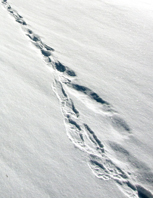 Brown bear – one of the big four. Photo: Marcus Elmerstad.
Brown bear – one of the big four. Photo: Marcus Elmerstad.
The big four
Wolverine – a big-footed gatherer
In winter you often see wolverine tracks in Gränslandet. With their large feet they lope on top of the snow, hunt and stash away food. This has given the wolverine a reputation for being a glutton. But wolverines are actually not very good hunters and survive largely by not being too fastidious. They often follow in the tracks of other predators – gathering and eating carrion left by others.
The landscape in Gränslandet is suited to the wolverine. There is a lot of sparsely forested bouldery terrain, where it can dig its den or climb up a giant pine to keep a lookout
Berries build bears
In summer you often see evidence of brown bear in the area. It could be dug out ant hills or scratch marks on a tree. In autumn they deposit large dung heaps, full of berries.
With luck, you may see a bear foraging for berries on a mountain slope in September–October. They are in a hurry to build up their fat reserves before the winter and can eat as much as 100 kilos of berries in a day.
Wolf and lynx – occasional visitors
There are no known wolf territories in Gränslandet, but now and again the odd wolf passes through, mainly a young animal searching for a mate. As long as wolves can find food they can live in almost any environment, but they mostly stay away from humans. Wolves feed mostly on moose, roe deer and reindeer, supplemented by beavers, hares, voles and frogs.
Lynx should thrive on the bouldery slopes in Gränslandet where it could easily create a den. Even so, it’s not particularly common.
 The tracks from the wolverine's big feet look like snowshoe imprints.
The tracks from the wolverine's big feet look like snowshoe imprints.
 Bilberry – the bears' favourite food.
Bilberry – the bears' favourite food.
 Solitary wolves pass through Gränslandet.
Solitary wolves pass through Gränslandet.





